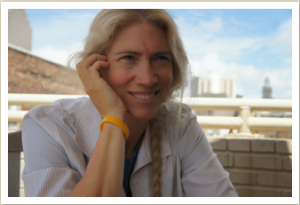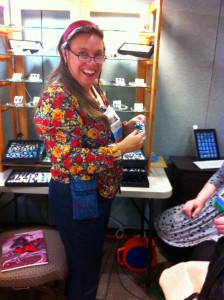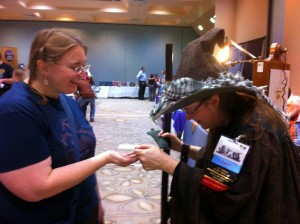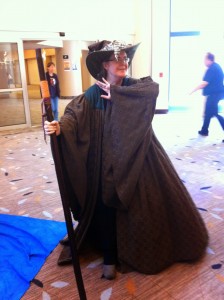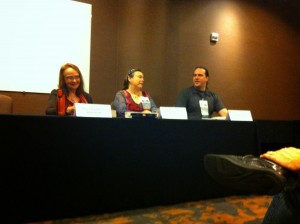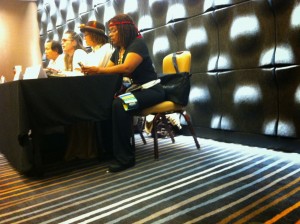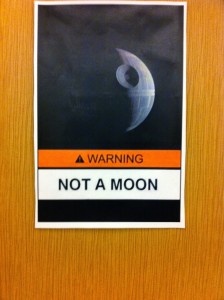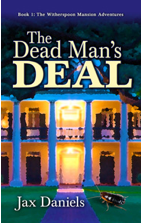Metaphors are figures of speech that bring drama, color, texture, vision, history, action, or thrill to your work. For example:
Wikipedia starts with this definition:
A metaphor is a literary figure of speech that uses an image, story, or tangible thing to represent a less tangible thing or some intangible quality or idea (e.g., Her eyes were glistening jewels).
In Greek, the term metaphor meant “carry something across” or “transfer.” Aristotle defined it as “the act of giving a thing a name that belongs to something else.” Perhaps the most well-known type of metaphor is the simile. A simile uses the words as or like to give a much more comparative effect that transfers meaning from one element to another.
She hopped out of here quick as a bunny.
Life is like a box of chocolates.
In more subtle uses, however, a reader may not even recognize a metaphor, since no comparative words make it obvious a comparison has happened.

As the sun set, night slowly spread its black wings against the clouded sky.
Obviously the night has no wings, but it is still being compare to something with black wings, perhaps a bat or raven—just without the use of like or as. Moreover, either creature brings more ominous images to the mind, gently leading the reader into a darker mood and setting.
His temper boiled over.
In this example, the verb is the metaphor, connecting a new property that isn’t inherent in the noun. For example, one’s temper is a state of mind or a feeling. But hot water boils. We’ve gone beyond merely informing the reader about his state of emotion (“he’s mad”) into suggesting a state of danger (“he’s hot—don’t touch him”).
Writing and Using Metaphors
Consider the following.
Her eyes were like the sea.
Readers might think color; blue-green, maybe gray. But they may also think calm and peaceful or deep and vast. By suggesting the sea you’ve invited your reader to imagine more about the character than simply the color of their eyes. Jennifer, the editor in our group, loves the word connotation. It’s critical in metaphors, as you can see in this example:
She had a deep, throaty, genuine laugh, like that sound a dog makes just before it throws up.
What is this saying about the sound, really? About the character making it? About the situation? About, well, the writer? When creating a metaphor you’ll want to consider both the reader and the world you’re writing about. For example:

Watching the monitor, Mary’s fingers flew over the keyboard as she quickly typed in the dBase query. She was faster than a one-hundred megabit per second download.
Okay, you may happen to know that’s pretty frickin’ fast. However, the reader may not. This techy metaphor may have missed him or her. By using such techno-jargon, I’ve targeted a thin audience. That may be fine, if the book is about high-tech hackers. Now consider this:
In only one afternoon, Andrea milked the cows, fed the chickens, mucked the stalls, and churned her aunt’s butter. She was faster than a one-hundred megabit per second download.
Even if the readers are going to be a bunch of computer geeks (for some reason), we’ve lost touch with the setting and scene of the story. Yes, the reader knows that’s fast, but we’ve essentially kicked them out of this world.
So maybe something like…

She was faster than slicked lightning.
Ok, that’s a bit more acceptable. But since we started on farm, how about staying on the farm?
She was faster than her uncle’s prized mare on the Beaufort County racetrack.
Interesting. Not only do we get the point, but we learned she lives in or near Beaufort County, and her uncle races horses.
HOMEWORK (?!)
Want to try your hand? Here are three starts to metaphors, including similes. For each, write a serious metaphor and a humorous one. Post your work in the comments, if you’d like. Show off your creative side!
1. The mountains were __________.
2. The parchment was like __________.
3. The TARDIS looked as if __________.
The Top Ten Worst of the Worst
- The ballerina rose gracefully en pointe and extended one slender leg behind her, like a dog at a fire hydrant.
- The young fighter had a hungry look, the kind you get from not eating for a while.
-
He was deeply in love. When she spoke, he thought he heard bells, as if she were a garbage truck backing up.
-
The little boat gently drifted across the pond exactly the way a bowling ball wouldn’t.
-
He was as tall as a six-foot, three-inch tree.
-
It was an American tradition, like fathers chasing kids around with power tools.
-
From the attic came an unearthly howl. The whole scene had an eerie, surreal quality, like when you’re on vacation in another city and Jeopardy comes on at 7:00 p.m. instead of 7:30.
-
Even in his last years, Granddad had a mind like a steel trap, only one that had been left out so long, it had rusted shut.
-
The plan was simple, like my brother-in-law George. But unlike George, this plan just might work.
And my personal favorite—it’s either really bad or really good…
- Her vocabulary was as bad as, like, whatever.
About Jax Daniels
Leasspell is proud to announce that two of our members, Jax and Denise, won first and second place in the 2013 Assent publishing contest for their fantasy imprint, Phantasm Books. Jax’s debut novel takes place in her (now) home of New Orleans, and for all I know, she could live next door to Winki Witherspoon and Gateway Manor! Her book is full of fun characters, adventure, and imagination.
Dead Man’s Deal: When Winki Witherspoon inherits a New Orleans Mansion, she also inherits her own Magical talent. Can she master it and discover her late husband’s traitor before she, too, is destroyed?
Available from Amazon in August, 2014.


